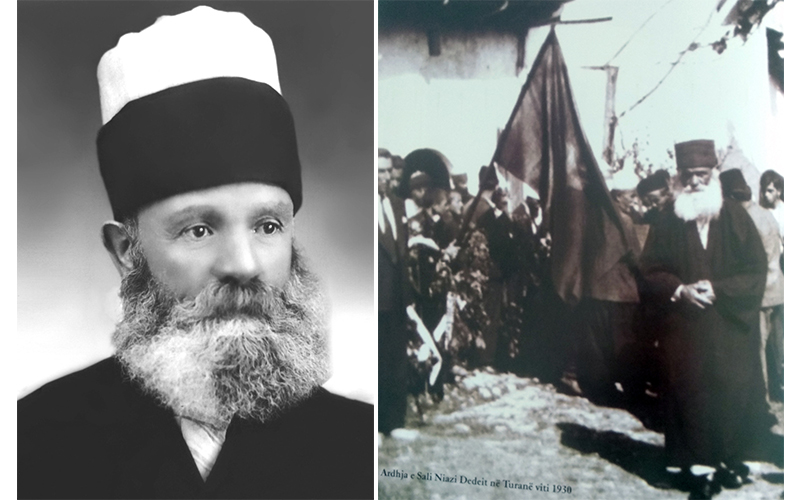
Today marks the 91st anniversary of the arrival in Albania of the former Bektashi World Leader Sali Niazi Dede. For this day, under the care of the Bektashi World Leader, His Grace, Haxhi Dede Edmond Brahimaj, in the Holy See, but also in other Dedeliks or communities inside and outside the country where millions of Bektashi believers live, measures have been taken to commemorate this date of the role of Sali Niazi Dede as a clergyman and patriotism.
Sali Niazi Dede, was born on March 5, 1876 in Starje, Kolonja. He was the biological son of Dervish Cufa. At that time, Bektashism was widespread in tekkes and dervishes were widespread throughout Albania and in other Balkan countries, neighbors of us, and the Bektashi doctrine, “Without a Nation there is no religion”, was becoming more and more known in these territory.
The family, social environment and the area of Kolonja, where the tekkes of Starje, Leskovik, Qesaraka, Kreshova lived, left deep traces in his childhood. He completed his primary education in his hometown. He emigrated when he was young with his family to Istanbul. There he continued the school of the time and thanks to that Albanian spiritual heritage of the Bektashi faith, he always went to visit the tekke of Haxhi Bektash and decided to enter in the path of this faith with full will. In 1896 he was located in Nevshehir, in the famous tekke of Haxhi Bektash Veli and enrolled in the tekke school. In the tekke school he immediately embraces not only the teachings of the Qur’an, the hadiths of the Prophet Muhammad but also the keys of mystical knowledge. With this vision he was endowed with complete religious culture. Certainly in the efforts to acquire Bektashi knowledge by knowing not only the teachings but also the study of the major works of the great mystics of the East such as Ghazaki, Fazali, Suhreverdi, Muhijdin Arabiu, Omar Ibn Faridhi, Ibn Sebini and Mevlana Jalaluddin Rumi one of the prides of mankind and one of the great mystics of the Islamic world. In Mevlana’s teachings he learn to stay away from arrogance, pride, selfishness and neither to run after materials.
In 1897, he becomes myhib and dervish. Two years later, in 1899, in a special ceremony becomes Myxheret (did not marry). It is interesting that here, he attracts the attention of the former Leader of the time, Haxhi Fejzi Dede (originally from the village of Maricaj in Tepelena), who keeps him close and influences the ranks of the Bektashi hierarchy. In 1901 ‘father; and in 1913, “grandfather.” Former Grandfather Fejzi Dede, sends him in 1908 on a mission to Albania to collect the necessary aid for that time of the World Headquarters in Turkey. This mission, Sali Niazi Dedei successfully completed and returned to Haxhi Bektash. For his merits of work in these years of service as a clergyman he entered the World High Clerical Council. In 15 years of a rich spiritual, clerical life as well as endless worship of the Creator gave the results of his preparation, organizer and spiritual leader and helper in other parts of the world.
With the passed away from this life of the former Bektashi World Leader, Haxhi Fejzi Dedei, the High Parental Council appointed Sali Niazi to the high position of leader of this faith in 1914, World Leader. From this period, he led the Bektashi World Headquarters in Turkey until 1926. The activity of Sali Niazi Dede in this period, is known to all Bektashi Dedeliks of the world. Not only in Anatolia, but also in Iran, Iraq, Azerbaijan, Turkmenistan, Greece, Romania, Bulgaria, Yugoslavia and as far away as Asia. his name was revered among the millions of believers of the world.
When the Turkish parliament, by a special decision, in December 1925 ordered the closure of all tekkes in Turkey, Sali Niazi Dedei comes back to his homeland, Albania. Sali Niazi Dede, came to Albania with clear ideas for increasing the Bektashi faith, here in the southwest of Christian Europe. This challenge would pass only through the teachings of Haxhi Bektash Veli. As soon as he steped on Albanian soil, the prominent Bektashi cleric tried, in addition to the traditional spirit of the Bektashi faith, of the ordinary believers. In the letter he sent to his myrshrid, father Ali Naxhi Bajkali, in those last days of January 1930, after describing the journey to Albania from Saranda to Korça, he wrote, among other things:… “Going to Turan with twenty-five cars will to remain an unforgettable and very precious memory for me. We will stay here for a few days and we will go to Tirana to take the order of the Grandfather. ” The first Bektashi institution in the world in Albania.
This was accompanied by meetings of King Zog in February and his appointment as World Bektashi Leaader in March of that year. The government of Zog, respecting the will of the Bektashi clerics, by a special decree appointed in March 1930 Sali Niazi Dedena, the World Leader of the Bektashis. For eleven years, Sali Niazi Dede, was able to educate and inspire dozens and dozens of Bektashi dervishes and fathers, to walk unwaveringly and full of purity on the path of Hak. There are dozens of fathers who left their tekkes and for weeks, went to Tirana, receiving not only religious lessons from their high myrshid, but wanting to follow his path, with wisdom and brotherly love. Many dervishes in his period saw the virginity ceremony and many of the fathers surrendered to their grandparents, such as father Mehmet Kruja, father Xhafer Përmeti, father Murat Frashëri, father Sejid Leskoviku, father Zylfo Turani, father Sirriu of Cairo and many others. The capital in Tirana progressed both in organization but also in spiritual education, he also set up the school in special courses, in the preparation of dervishes with director father Qazim Bakalli. Like, many families and personalities from Tirana and other cities of Albania took over from Sali Niazi Dede. But, he honored and respected the Albanian leader Bektashi the great national poet Naim Frashëri in 1937, when his remains were brought to Tirana by the government and placed in the premises of the World Headquarters, where a special monument was erected by him. He faithfully preserved the Bektashi code as a tradition within the faith. But the independence of ideas and actions in educating the patriotic spirit, the natural resentment towards the occupier, undoubtedly led to the resurrection of the blind powers towards Sali Niazi Dedei. The murderous hand that shot at Sali Niazi Deden, on November 28, 1941 together with the dervishes Aziz thought he would scare the whole army of Bektashi clerics. But that did not happen. However, the clergy who came after him testified the patriotism and spiritual purity as much as their myrshid, slaughtered, disagreeing with the invader, with the tyrannies and ideas that killed human freedom. Baba Rexheb writes about him: “Sali Dedei went martyr of his sacred mission, but his memory and work are always alive, unforgettable and live in the hearts of all Bektashis and their benefactors…”
Descendant grandfathers have always respected and still respect him today, Dede Ahmeti Myftari World Grandfather, on November 28 in his memory inaugurated the memorial of Sali Niazi Dede and evaluations over the years as: Decorated with the “Order of the First Class” for patriotic activities in 1993 and ‘ALBAPOST’, in the cycle of prominent figures, for 2001 issued the stamp issue. Also, Sali Niazi Dede other Dedes were proclaimed “Martyrs of the Fatherland” (2011) and “Honor of the Nation” in 2019. The World Grandfather, His Grace, Haxhi Dede Edmond Brahimaj praises this disciple: “Among these bright names of the martyrs and ideators of the nation, undoubtedly part of the pure emir of the Bektashi cleric, Sali Niazi Dede came to Albania with a clear vision and full of hope that the World Bektashi Center, being located in the southwest of Christian Europe in peace and coexistence with other religious faiths, but would also contribute to harmony between religions. This major act, to this day, stands full of dignity among the various solutions of the Albanians, throughout its history, this is the pride of all Albanians and today in this 90th anniversary of his arrival in Albania is very significant and unimaginable. Today we bow with the deepest respect to such personalities as “Martyr of the Fatherland” and “Honor of the Nation” who do honor not only to the Bektashi faith, but to all of Albania and the world. “
Nuri ÇUNI
